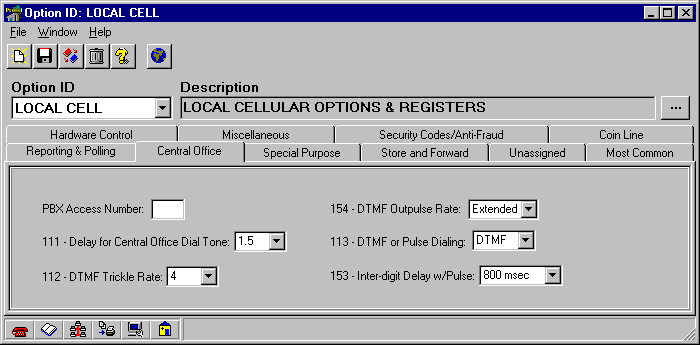Central Office
The Central Office tab of the Options window is used to configure a payphone for a CO
ís specific operating requirements for dialing and dial tone.
To get to the Central Office tab, select
Options Records from the Configuration button in the Navigator or the Navbar to open the Options window. The Most Common tab is already selected when the Option window opens. Click on the Central Office tab.

The Central Office tab of the
Options window has the following options in it:
PBX Access Number: If necessary, enter the number needed to get an outside line for the payphone.
111
ñ Delay for Central Office Dial Tone: Wait for specified number of seconds (1.5 or 3 seconds) before dialing to ensure that a dial tone from the central office has been provided.
112
ñ DTMF Trickle Rate: If the time in between dialed digits is too long, the central office will drop the line. On the other hand, if the phone finishes dialing the number before the user has deposited the money, the payphone owner is responsible for the charges incurred, whether or not the user actually deposits the money. In order to avoid both circumstances, a Protel payphone will dial another digit every 4 or 8 seconds, whichever is selected in this field. If the user has not deposited the money before the last digit is dialed, the phone will drop the line and start over again. If the money is deposited right away, the digits are dialed without delay.
154
ñ DTMF Outpulse Rate: If the phone is able to dial without ìTrickleî (as when a user deposits the money before dialing, see option 112 ñ DTMF Trickle Rate, above), set the dialing speed to Standard or Slow. Slow may be required when connecting to older systems.
113
ñ DTMF or Pulse Dialing: Select how the phone will dial all outgoing calls, using pulse or DTMF (touch-tone).
153
ñ Inter-digit Delay w/ Pulse: When pulse is selected above, set the delay between dialed digits: 500 or 800 milliseconds.